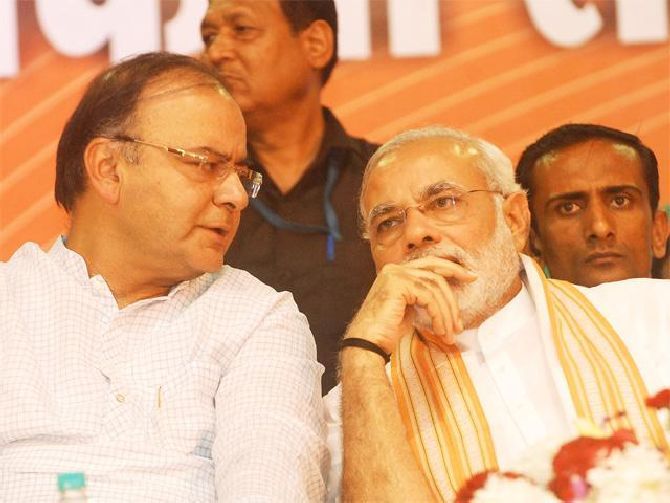This move will enable it to incur higher-than-mandated borrowing, and possibly spending, till the 2024 Lok Sabha election cycle.

The Narendra Modi-led government is using the Finance Bill 2018 to insert provisions in the Fiscal Responsibility and Budget Management (FRBM) Act, in a move that will enable it to incur higher-than-mandated borrowing, and possibly spending, till the 2024 Lok Sabha election cycle.
Moreover, a fiscally ideal situation in which tax and non-tax revenues are used for administrative expenses and capital receipts, including market borrowings, are used for infrastructure expenditure, is likely to be upended as well. Such a situation could also provide for further amendments proposing that the Centre be no longer obliged to report revenue deficit numbers.
The Centre is looking to amend the FRBM Act to allow it to come down to a fiscal deficit target of 3 per cent of GDP by 2020-21, as opposed to 3.5 per cent in 2017-18. However, the debt limit of 40 per cent of GDP by the Centre and 60 per cent for Centre and states combined will need to be achieved by 2024-25, if the Finance Bill is passed unchanged. This debt limit runs parallel to the fiscal deficit target.
The Finance Bill 2018 states that the central government shall “take appropriate measures to limit the fiscal deficit to three per cent of gross domestic product by the 31st March, 2021,” and endeavour to ensure that “the general government debt does not exceed sixty per cent,” and “the central government debt does not exceed forty per cent of gross domestic product by the end of financial year 2024-2025.”
Further changes in the FRBM Act, through the Finance Bill, also free up the government from reporting revenue deficit.
The FRBM Act states that the Medium Term Fiscal Policy Statement, which is released along with the Budget, will include an assessment of sustainability relating to the balance between revenue receipts and revenue expenditure and the use of capital receipts including market borrowings for generating productive assets. The Finance Bill proposes that the entire sentence related to revenue receipts and revenue expenditures be deleted.
The FRBM Act also states that the Macro-Economic Framework Statement, which is also part of Budget documents, shall contain an assessment relating to the growth in the gross domestic product and the fiscal balance of the Union government as reflected in the revenue balance and gross fiscal balance. The Finance Bill proposes that the word ‘fiscal balance’, which essentially means fiscal deficit, be omitted.
In his Budget speech on Thursday, Finance Minister Arun Jaitley had revised the fiscal deficit target for 2017-18 to 3.5 per cent of GDP from 3.2 per cent budgeted target. For 2018-19, he set a target of 3.3 per cent. Jaitley had also said that the Centre was adopting key recommendations of a report of a panel that had been tasked with revamping the FRBM Act.
“The prime minister and the government have always attached utmost priority to prudent fiscal management and controlling fiscal deficit,” Jaitley had said.
However, the erstwhile panel, led by Fifteenth Finance Commission Chairman N K Singh, had recommended a fiscal deficit target of 2.5 per cent of gross domestic product, revenue deficit of 0.8 per cent, a combined centre-state debt ceiling of 60 per cent, and a central debt ceiling of 40 per cent by fiscal year 2022-23, the end point of its six-year medium term fiscal roadmap. The panel had also recommended a fiscal deficit of 3 per cent for 2018-19.












 © 2025
© 2025